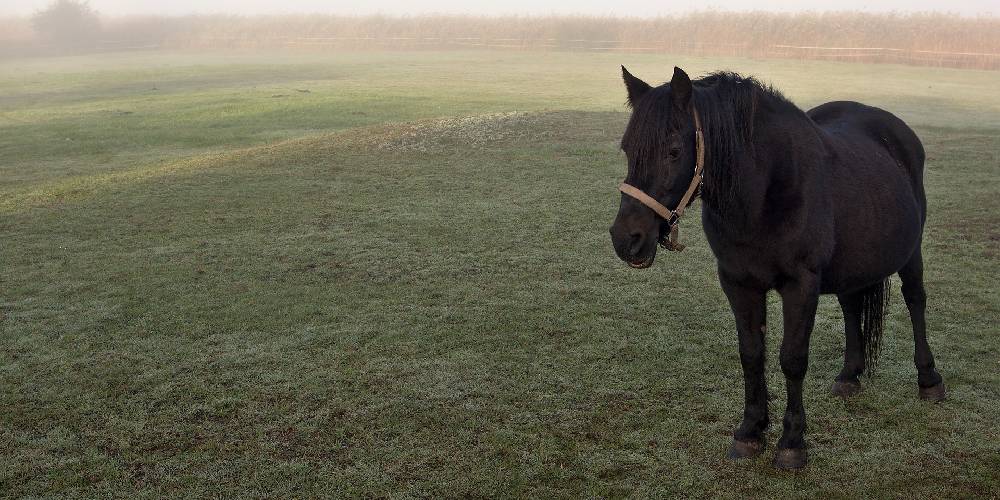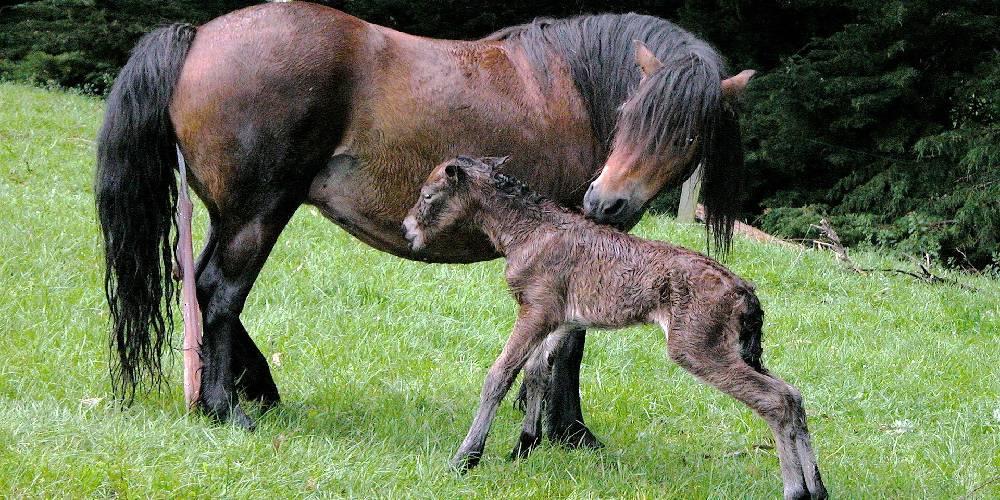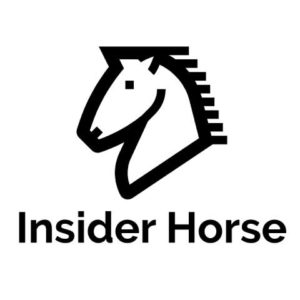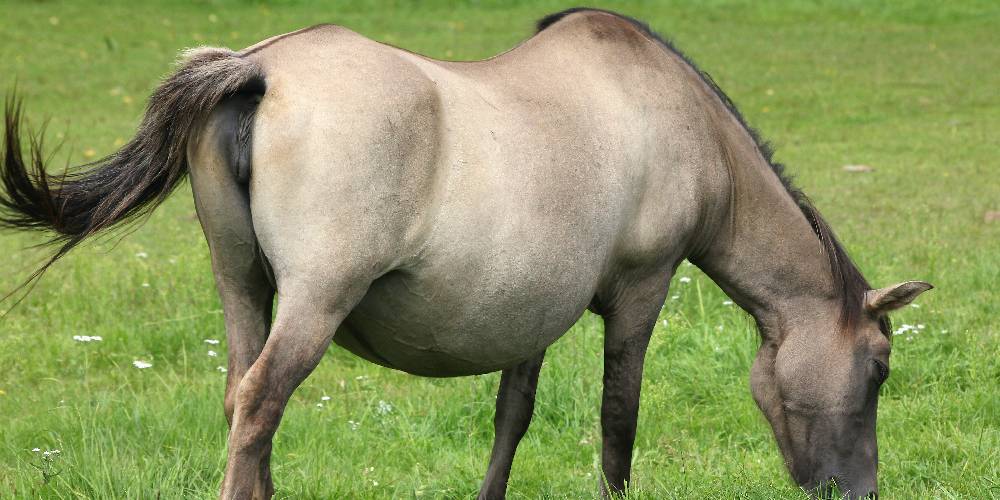Oh no! Your mare was somehow in the same pen as a stallion and you didn’t realize until now! What if she is pregnant? Is there a way to tell if she is pregnant early on? And do pregnant horses need special care?
Though I know there is a lot to think about in this situation, don’t stress. Determining whether or not your horse is pregnant is important for both the horse’s and her unborn foal’s safety and health.
Is My Horse Pregnant?
Pregnant horses will show a variety of symptoms that can point to pregnancy. Missing their heat cycle, changing their appetite, eating more, drinking more, and getting a swollen udder will be the first signs of pregnancy in horses. A couple of weeks after breeding, a veterinarian can do an ultrasound on the horse to determine whether or not there is a heartbeat in the fetus or if the mare is not pregnant at all.
Symptoms Of Pregnancy
There are a number of symptoms that a horse will show throughout her pregnancy, some symptoms that you might see include:
- Increased Eating
- Increased Drinking
- Changed Appetite
- Restlessness
- Growing Belly
- Swollen Udder
- Decreasing Amount of Sleep
- Skipping Her Heat & Fertility Cycle
- Feel & See The Foal Kicking & Moving In Her Belly (later in her pregnancy)
How Long Are Horses Pregnant For?
Horses are pregnant for 11 months. Imagine carrying a foal in your belly for nearly a year!
Horses will generally both get pregnant and give birth in spring as this is a warmer time of year so the foal can grow and get stronger to be able to survive a cold harsh winter.
Are There Stages Or Trimesters To A Horse’s Pregnancy?

Yes! Just like in people, horses have 3 stages or trimesters to their pregnancies. Each of these stages come with their own signs and symptoms which also come with their own special needs and preparations.
Stage 1:
Stage one or trimester 1 starts from the day the horse conceives her foal and ends about 60 days later. Around 13 to 14 days after the horse ‘takes,’ a veterinarian should be able to find a tiny embryo and a heartbeat in the mare’s womb. If a heartbeat or embryo is not found, the mare is likely not pregnant.
Even though the foal is super tiny and the mare doesn’t appear to be pregnant when looking at her from the outside, it is NOT safe to ride the mare in the early days of her pregnancy. This is because the first trimester or stage in any pregnancy is the most tedious as if a mare is to miscarry her foal, now would be the time that this would happen.
The only noticeable symptoms at this stage in the pregnancy would be increased eating and drinking and the missing of her heat and fertility cycle.
Stage 2:
Stage two or trimester 2 starts after the 60 days of the first trimester end. This means that stage 2 of the pregnancy starts on day 61 and will end on day 270.
During this stage, the foal is growing the fastest. Your mare will go from looking like any other female horse to being noticeably larger in the stomach.
During this time of the mare’s pregnancy, the horse is safe to ride, but remember not to over do it or ask too much of her. Be respectful of the fact that she is carrying a baby in her womb.
Some new behaviors or symptoms your horse may show include increased appetite, drinking more water, enlarged stomach, kicking or movement of the foal, and the continued missing of the heat and fertility cycle.
Stage 3:
Stage three or timester 3 is usually the hardest part of the pregnancy on the mare. At this stage, the mare is rapidly nearing her delivery day and the foal is getting bigger and bigger. Mares will often begin to lose weight faster and become increasingly uncomfortable so giving them a comfortable place to sleep and plenty of food and water is important.
This part of the pregnancy starts on day 271 and ends with the foal’s delivery.
You can still ride your mare in the early stages of this third stage, but I recommend getting off her back for the final days of her pregnancy.
Turning your mare out frequently so she can stretch her legs and get her exercise and give her all the hay she needs.
The signs or symptoms she will show during this stage include an obviously extended belly, restlessness, uncomfortableness, ever increasing appetite, swollen udder, milk production, kicking and movement from the foal, and a decrease in the amount of sleep she gets.
How Do I Know My Mare Is Close To Delivery?

When your horse is within a few hours of delivery, you will be able to tell by a shift in her behavior. Some signs to look for include:
- Anxiety, nervousness, agitation, or restlessness
- Pacing
- Lying down
- Kicking at her belly
- Irregular urination patterns (can include excessive urination or absent urine)
- Full udder (dripping milk is not uncommon)
- Looking back at her rear or at her stomach
- Flicking and twitching of the tail
- Sweating (usually on the neck and flanks)
How Should I Prepare My Horse’s Stall For A Delivery?
If you are nearing your horse’s due date, preparing her stall and yourself for the delivery is very important. Some things to add to her stall if they are not there already include:
- Comfortable bedding (straw is better than shavings for a delivery so the flakes won’t stick to a newborn foal)
- An extra bucket or two of water
- Hay (preferably in a feeder or hay net so it is off the ground)
It is also important to try to keep some emergency items nearby in case you are there when your mare gives birth. Some of these things include:
- Tail bandages (I would even bangage up her tail if you are expecting a delivery soon to keep her tail clean and away from the fluids during the birth)
- Towels (to help dry and warm the baby)
- Lubricant of some sort (to help the baby come out easier and smoother)
- Gloves
- Disinfectant (to dip the foal’s navel in right after the birth to limit possibility of infection)
- Thermometer
- Clean clothes

